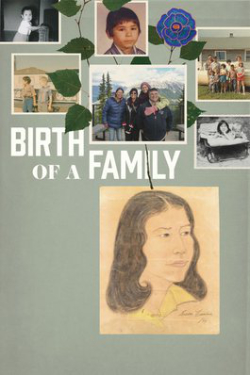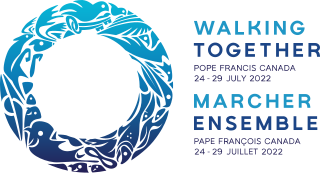
Buffy Sainte-Marie, is an American singer-songwriter, musician, and social activist.

The CanadianIndian residential school system was a network of boarding schools for Indigenous peoples. The network was funded by the Canadian government's Department of Indian Affairs and administered by Christian churches. The school system was created to isolate Indigenous children from the influence of their own culture and religion in order to assimilate them into the dominant Canadian culture. Over the course of the system's more than hundred-year existence, around 150,000 children were placed in residential schools nationally. By the 1930s, about 30 percent of Indigenous children were attending residential schools. The number of school-related deaths remains unknown due to incomplete records. Estimates range from 3,200 to over 30,000, mostly from disease.

The Kamloops Indian Residential School was part of the Canadian Indian residential school system. Located in Kamloops, British Columbia, it was once the largest residential school in Canada, with its enrolment peaking at 500 in the 1950s. The school was established in 1890 and operated until 1969, when it was taken over from the Catholic Church by the federal government to be used as a day school residence. It closed in 1978. The school building still stands today, and is located on the Tk’emlúps te Secwépemc First Nation.

Job Ayo Akinde, known as John Akinde, is an English professional footballer who plays for League Two club Colchester United.
Connie Walker is a Pulitzer-prize winning Cree journalist.
Nathan William Byrne is an English professional footballer who plays for Charlotte FC. He can play as either a wing back or a right-back.
The Sixties Scoop, also known as The Scoop, was a period in which a series of policies were enacted in Canada that enabled child welfare authorities to take, or "scoop up," Indigenous children from their families and communities for placement in foster homes, from which they would be adopted by white families. Despite its name referencing the 1960s, the Sixties Scoop began in the mid-to-late 1950s and persisted into the 1980s.

Tom Andrew Nichols is an English professional footballer who plays as a striker for League Two club Mansfield Town.

Marvin Rees is a British Labour Party politician serving as Mayor of Bristol since 2016.
Richard John Feehan is a Canadian politician who was elected in the 2015 Alberta general election to the Legislative Assembly of Alberta representing the electoral district of Edmonton-Rutherford. He was made Alberta NDP caucus chair on June 3 and elected deputy chairman of committees on June 12, 2015.
Tasha Hubbard is a Canadian First Nations/Cree filmmaker and educator based in Saskatoon, Saskatchewan. Hubbard's credits include three National Film Board of Canada documentaries exploring Indigenous rights in Canada: Two Worlds Colliding, a 2004 Canada Award-winning short film about the Saskatoon freezing deaths, Birth of a Family, a 2017 feature-length documentary about four siblings separated during Canada's Sixties Scoop, and nîpawistamâsowin: We Will Stand Up, a 2019 Hot Docs and DOXA Documentary award-winning documentary which examines the death of Colten Boushie, a young Cree man, and the subsequent trial and acquittal of the man who shot him.

The National Day for Truth and Reconciliation, originally and still colloquially known as Orange Shirt Day, is a Canadian holiday to recognize the legacy of the Canadian Indian residential school system.
Tanya Talaga is a Canadian journalist and author of Anishinaabe and Polish descent. She worked as a journalist at the Toronto Star for over twenty years, covering health, education, local issues, and investigations. She is now a regular columnist with the Globe and Mail. Her 2017 book Seven Fallen Feathers: Racism, Death, and Hard Truths in a Northern City was met with acclaim, winning the 2018 RBC Taylor Prize for non-fiction and the 2017 Shaughnessy Cohen Prize for Political Writing. Talaga is the first woman of Anishinaabe descent to be named a CBC Massey Lecturer. She holds honorary doctorates from Lakehead University and from Ryerson University.

Birth of a Family is a 2017 First Nations Canadian documentary directed by Tasha Hubbard and co-written by Hubbard and Betty Ann Adams. It follows three sisters and a brother, adopted as infants into separate families across North America, who meet together for the first time.
Jessica Matten is a Canadian actress and film producer.
Raven Sinclair (Ótiskewápíwskew) is Cree/Assinniboine/Saulteaux and a member of Gordon First Nation of the Treaty#4 area of southern Saskatchewan and member of the Faculty of Social Work at the University of Saskatchewan. She is a survivor and expert on the Sixties Scoop, the practice of taking Indigenous children from their families and placing them in foster care or adopting them out to white families. She is a critic of the current child welfare system in Canada, especially as it relates to Indigenous peoples. She is a professor, film maker, author and facilitator. Sinclair is also a founding editorial member of IndigenousVoices in Social Work (UHawaii), and a regional editor for AlterNative: An International Journal of Indigenous Peoples.
Beaverhouse First Nation is an Indigenous first nation located on the banks Kirkland Lake in the Misema River system.
Cassidy Caron is a Métis politician. She was elected as the president of the Métis National Council on 30 September 2021. As the chairperson of the Métis Youth British Columbia, she served as the Minister of Youth for the Métis Nation British Columbia from September 2016 to September 2020.

Pope Francis visited Canada from July 24 to 29, 2022, with stops in the provinces of Alberta and Quebec and the territory of Nunavut. The trip mainly focused on apologizing for the Catholic Church's role in the Canadian Indian residential school system and on reconciliation with the country's Indigenous peoples. It was the first papal visit to Canada since 2002, when Pope John Paul II visited Toronto for World Youth Day.
Cody Caetano is a Canadian writer from Toronto, Ontario, whose debut memoir Half-Bads in White Regalia was the winner of the Indigenous Voices Award for English prose in 2023.








